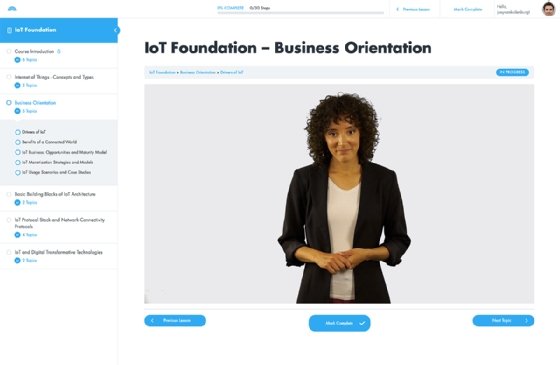9 IoT training certifications to take your next career step
IoT training certifications offering skills in IoT development, networking and security can give tech experts an advantage, especially when IoT skills are in high demand.
IoT is a rapidly growing market, and one challenge to companies embracing the technology is the lack of specialists who know and understand IoT's many complexities.
An IDC survey predicted that, by 2026, more than 90% of organizations worldwide will be affected by an IT skills crisis. In addition, Statista projected that there will be almost 40 billion connected IoT devices around the world by 2033. This means IoT skills will be in high demand.
One way you can demonstrate your background in IoT is through certifications that can help you stand out to employers. Fortunately, there are many certifications to choose from. The question is, what's the right one? Here, in no particular order, are nine certifications to consider to advance your career.
1. Cloud Credential Council IoT Foundation Certification
Offered by the Cloud Credential Council (CCC), the IoTF certification is considered one of the top IoT certifications available. It covers principal IoT topics and is vendor-neutral.
The CCC certification covers six learning modules, including basic concepts and terminologies, business orientation, IoT architecture, enabling technologies, security and governance, and business use cases. There are no prerequisites to take the course, but you're expected to have a grasp of cloud-related terms and concepts.
The CCC offers in-person training partners across the U.S. and other countries, as well as online self-study. Course length depends on how long participants want to study. There is a one-hour, 25-question multiple-choice exam that participants must pass to secure certification.
All study materials and a voucher for the exam cost $349.

2. CertNexus Certified Internet of Things Practitioner
Another in-depth, vendor-neutral certification program is CertNexus CIoTP, which shouldn't be confused with the Certified IoT Security Practitioner certification.
This course covers six topics, ranging from planning and programming IoT devices to deploying and managing the devices in real-world use cases. This certification is notable because it's accredited under the American National Standards Institute ISO/IEC 17024 standard, which is required for many government projects.
Costs depend on the resources participants choose. Self-study options start at around $424, and instructor-led classes are also available. If purchased separately, the exam voucher is $367.50.
3. CertNexus Certified IoT Security Practitioner
This is a separate certification program focused on IoT's extra security needs due to its remote nature. IT experts who decide to demonstrate proficiency in tools from any IoT vendor should take this CIoTSP certification. It covers every aspect of IoT security in the IoT device lifecycle, including design, implementation, operation and end-to-end management.
In eight lessons, students learn and prepare for the ITS-110 exam covering IoT risk management; interface, network, data and physical security; IoT resource access control; data privacy; and software and firmware risk management.
This course requires previous fundamental knowledge of IoT technology, which can also be acquired through the CertNexus CIoTP course and exam ITP-110. Attendees have various purchasing options for digital courseware, labs and an exam voucher, whether they choose self-led study or instructor-led courses over three days. Training materials start at $99, and the exam voucher is $367.50.
4. Cisco's Introduction to IoT and Digital Transformation
This is a free, six-module online course suited for beginners who are getting their feet wet in IoT.
The course covers IoT devices and how they connect to networks; the programming languages, such as Python, that are used to develop IoT applications and how they work; what qualifies as "big data" and how big data must be stored; AI and machine learning in IoT; the security requirements for IoT devices and networks; and IoT's role in the business.
Once the six modules are completed, a final exam is given and a certificate is awarded upon passing the exam.
5. An Introduction to Programming the IoT Specialization on Coursera
For those interested in learning how to program IoT devices, this is a great option for exploring different IoT programming languages and platforms. It also offers certification.
The six-course program is available on Coursera but taught by the University of California, Irvine. Participants will learn how to program in Python and C for the Arduino and Raspberry Pi environments. Coursework includes online lectures, labs and hands-on projects.
You can choose which courses you want to complete. These include the "Introduction to the Internet of Things and Embedded Systems," "The Arduino Platform and C Programming," "Interfacing with the Arduino," "The Raspberry Pi Platform and Python Programming for the Raspberry Pi," "Interfacing with the Raspberry Pi" and "Programming for the Internet of Things Project."
The entire program is completed in approximately two months at a pace of 10 hours per week. Pricing isn't listed, but there is a free seven-day trial period and a free audit of the course.
6. Arcitura's IoT Architecture Course and Certification
A Certified IoT Architect has knowledge of the devices, technologies and protocols used to build IoT platforms, and an understanding of different IoT architecture layers and models.
Arcitura's three-module certification bundle costs $299 and includes the sections "Fundamental IoT," "IoT Technology & Architecture" and "IoT Technology & Architecture Lab." The content balances technical application and a general understanding of the business value behind IoT. A certification exam with prep kit can be purchased separately for $259.
7. Internet of Things certification from University of California, Irvine
This program gives participants a business overview of how organizations can take advantage of IoT and a close-up look at technologies such as Arduino and Raspberry Pi hardware systems. The University of California, Irvine offers an IoT certification for students who take three courses -- each consisting of three units -- for nine course credits and finish with a passing grade.
The three overarching courses offered in the program are "Introduction to the Internet of Things," "Designing and Integrating IoT Devices" and "Networking and Securing IoT Devices." The program also covers integration, standards and compliance, IoT business processes and security. IT professionals can take the nine-month program online for an average cost of $2,910.
8. Internet of Things Graduate Certificate from Stanford University School of Engineering
The Stanford graduate certificate would benefit IoT practitioners looking to expand their skill set and business professionals who work with IoT engineering teams. Before pursuing the certificate, applicants must first take the short non-credit course "Introduction to Internet of Things." Upon completing that course, participants must then take four graduate-level courses in areas such as sensors, embedded systems, networking and circuits.
Academic advisors can help participants select the IoT courses that best align with their professional and educational goals. Certain courses might require some prerequisite knowledge of specific programming languages or technology. Graduate certificate applicants must complete the course within three years, and tuition is based on the number of credit units taken.
9. The Iot-Inc Certified IoT Professional
The ICIP course and certification are intended for advanced IoT practitioners. It consists of 45 online modules, 163 lessons, 28 quizzes and a final exam. The course assumes a sound understanding of IoT, immediately exploring IoT technologies and approaches at a highly detailed and advanced level. This is a course best undertaken by IoT practitioners who have experience in IoT development and implementation but who want to go further in developing their understanding of IoT. The course is self-paced and priced at $1,199.
How to select the type and specialty of the course
Tech professionals who pursue IoT certifications to advance their careers have a wide range of choices they can tailor to their career goals. Each of the certifications listed above states clearly in its course outline who should take the course.
Certification programs offer foundational and business-oriented IoT courses to get started, even if tech professionals have little familiarity with IoT or work on the business side of IoT implementation. For individuals in this category, a vendor-neutral IoT course can provide a solid foundation.
IT experts in networks, applications, architecture or security might gain the most from IoT certifications for specific vendors or technologies used by their organization and the general market.
Editor's note: This article was updated in May 2025 to include updated course information and pricing and to improve the reader experience.
Mary E. Shacklett is president of Transworld Data, a technology analytics, market research and consulting firm.
Andy Patrizio is a technology journalist with almost 30 years' experience covering Silicon Valley who has worked for a variety of publications -- on staff or as a freelancer -- including Network World, InfoWorld, Business Insider, Ars Technica and InformationWeek. He is currently based in southern California.





